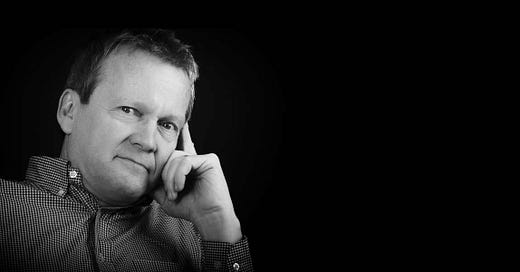#127 - Notes on Learning, Hattie and Sahlberg
Education Coffee is a 2xWeekly Newsletter on People, Ideas and Culture.
Why #LearningResearch?
My thinking on learning has evolved considerably over time. I have built on the work of so many educators and researchers. I am grateful to them for the work they do and the time they took from their schedules to document what they saw and observed in a variety of learning environments. In education like in every other field we must build on the work of others. There are teachers, principals and researchers across the world that may have faced the same problems you face today. In this series of #EducationCoffee newsletters I aim to summarize the work of these thinkers in the most accessible way possible. I will add links to help you with further research.
Pasi Sahlberg on Finnish Schools
Pasi Sahlberg (1959 to present), is a Finnish educator and scholar, who is known for his research on educational systems, particularly the Finnish education model. Here are some key points from his research on learning and education:
Equity Over Excellence: Sahlberg emphasizes the importance of equity in education, arguing that a system that supports all students equally leads to better overall outcomes than one that focuses on excellence for a few.
Less Standardized Testing: He advocates for reducing the reliance on standardized testing, suggesting that it can stifle creativity and lead to teaching to the test rather than fostering a deeper understanding of the material.
Teacher Autonomy: Sahlberg highlights the value of teacher autonomy, where educators are trusted to use their professional judgment to meet the needs of their students, rather than being constrained by strict curricula and frequent testing.
Collaboration Over Competition: He promotes collaboration among teachers and schools rather than competition, which he believes can lead to a more supportive and effective educational environment.
Holistic Education: Sahlberg supports a holistic approach to education that includes not only academic skills but also social and emotional learning, arts, and physical education.
Professional Development: Continuous professional development for teachers is a key component of Sahlberg’s vision for education, ensuring that educators are up-to-date with the latest pedagogical research and practices.
Play and Recess: He stresses the importance of play and recess in the school day, noting that they are crucial for children’s development and learning.
Start School Later: Sahlberg has suggested that starting school at a later age can be beneficial, as it allows children more time to develop and mature before beginning formal education.
Education Policy: He has been critical of education policies that are driven by economic imperatives and market-based reforms, such as school choice and privatization, arguing that they can exacerbate inequality.
Global Educational Change: Sahlberg has been involved in global educational change initiatives, sharing insights from Finland’s education system and helping other countries to consider how they might adapt similar approaches to their own contexts.
Sahlberg’s work often contrasts the Finnish approach with that of other countries, particularly the United States, and he has been a vocal critic of what he sees as the overemphasis on competition, choice, and test-based accountability in many education systems around the world.
John Hattie on Factors that Influence Student Achievement
John Allan Clinton Hattie (1950 to present) is a New Zealand education academic. He has been a professor of education and director of the Melbourne Education Research Institute at the University of Melbourne, Australia, since March 2011.
John Hattie’s research, particularly outlined in his book Visible Learning, synthesizes over 800 meta-analyses to identify factors that influence student achievement. Here are the key points:
Effect Size: Hattie uses effect size to measure the impact of various factors on learning. An effect size of 0.4 is considered the “hinge point,” representing average progress over a year.
Teacher Impact: Teachers have the most significant influence on student learning. High-quality instruction and feedback are critical.
Feedback: Providing timely, specific, and actionable feedback is one of the most effective strategies for improving learning outcomes.
Student Expectations: High expectations from teachers and students themselves significantly boost achievement.
Collective Teacher Efficacy: When teachers believe in their ability to influence student outcomes, it has a strong positive effect.
Formative Assessment: Regular assessment to guide instruction and provide feedback is highly effective.
Metacognitive Strategies: Teaching students to think about their own learning processes improves outcomes.
Classroom Discussion: Encouraging dialogue and interaction enhances understanding and engagement.
Peer Learning: Collaborative learning and peer tutoring have positive effects.
Teacher-Student Relationships: Strong, positive relationships between teachers and students foster better learning environments.
Direct Instruction: Explicit teaching of concepts and skills is highly effective when done well.
Self-Reported Grades: Students’ ability to assess their own performance accurately is a strong predictor of success.
Reducing Class Size: While often advocated, reducing class size has a relatively small effect compared to other factors.
Homework: The impact of homework varies by age; it is more effective for older students.
School Leadership: Effective leadership that focuses on supporting teachers and improving instruction has a significant impact.
Parental Involvement: Engagement from parents, particularly in supporting learning at home, positively influences achievement.
Hattie’s work emphasizes that while many factors influence learning, the quality of teaching and feedback are the most critical. His research encourages educators to focus on evidence-based practices to maximize student outcomes.
Notes and Links
John Hattie Profile – https://findanexpert.unimelb.edu.au/profile/428067-john-hattie
John Hattie Research Page – https://www.researchgate.net/profile/John-Hattie-2
John Hattie Visible Learning Website – https://visible-learning.org/
Pasi Sahlberg Profile and Research – https://pasisahlberg.com/
Pasi Sahlberg Books – https://pasisahlberg.com/books-pasisahlberg/books/
Pasi Sahlberg Presentations – https://pasisahlberg.com/presentations-pasi-sahlberg/presentations/
Abhishek Shetty





